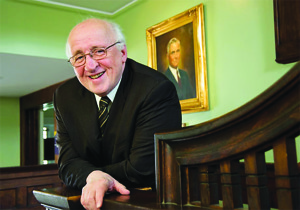Dr. Richard J. Mouw Speaks on Christian Convicted Civility
This year’s Christian Life Emphasis Week (CLEW) was graced with the teachings of key speaker and public intellectual, Doctor Richard J. Mouw. In settings such as chapel, lunch discussions, night sessions, and a coffeehouse Q and A, the theologian and philosopher exhibited the wisdom, grace, and humility he taught. Engaging and bright, Mouw spoke to the heart of Christian engagement with culture, pushing students to more deeply consider how their faith interacts with the world around them and how they can express love to those they disagree with.
 The celebration of CLEW during the first week of classes is a long standing tradition at Houghton College. It originated as a two week revival which invigorated the campus at the beginning of the new semester.
The celebration of CLEW during the first week of classes is a long standing tradition at Houghton College. It originated as a two week revival which invigorated the campus at the beginning of the new semester.
In recent years CLEW has served as a half week focused on realignment of priorities. Michael Jordan, Dean of the Chapel, said of CLEW, “It’s a way to set our minds on the things most important and to say as a community that our walk with Christ is important to us.”
During the week Mouw focused on awareness and thoughtful reaction to current events. This attention complimented Dean Jordan’s “Beyond the Bubble” semester-long, worship theme that aims to cultivate an internal, Christ-like foundation from which to react from.
Mouw’s sermons flowed cohesively with the undercurrent of “Convicted Civility” which is the idea that Christians should be people of great convictions who hold to those convictions while exhibiting all kindness and civility. In short, the way with which we interact with the world is as important as the ideas we bring to it.
During the coffeehouse chat Mouw shared about a time he spoke on NPR to a gay right’s activist. He treated the activist with respect and love asking, “Why are you hurt by and scared of people like me and how can we change that?” Later in the show someone called in on air and accused Mouw of bigotry. The activist responded to the caller defending Mouw. It is possible to disagree with someone and show them palpable love despite that difference.
Daniel Bellerose, a Junior International Development major, was struck by Mouw’s stance. He said of Mouw, “He is conservative and I am liberal, but I get along great with him. He doesn’t attack with his beliefs. Instead he strives for common understanding on both sides. He is teaching and exemplifying the key to bipartisan action and inter-party peace.”
Mouw’s idea of convicted civility is reminiscent of a book and movie that was popular several years ago. Donald Miller’s Blue Like Jazz tells the story of nonreligious thoughts of Christian spirituality. The pivot point of the memoir occurs when the college, which is passionately anti-Christian, is recovering from a reckless weekend of campus-wide chaos including heavy drug and alcohol use. Don and his Christian friends build a confession booth in the middle of their campus with a sign that says, “CONFESS YOUR SINS.” However, there is a twist. When the students come into the booth the Christian inside is the one confessing. Miller writes,
“We are going to confess to them. We are going to confess that, as followers of Jesus, we have not been very loving; we have been bitter, and for that we are sorry. We will apologize for the Crusades, we will apologize for those televangelists who steal people’s money, we will apologize for neglecting the poor and the lonely, we will ask them to forgive us, and we will tell them that in our selfishness we have misrepresented Jesus on this campus. We will tell people who come into the booth that Jesus loves them.”
The novel and Mouw’s sermons bring light to a deep need in the world for mutual respect, love, and humility. Being Christ-like in hard conversations means remembering that we are all human beings with thoughts, feelings, and experiences that have shaped us for better or worse. It means loving one another even through disagreements and debates. It means holding strongly to our convictions, but sharing them with tenderness.
